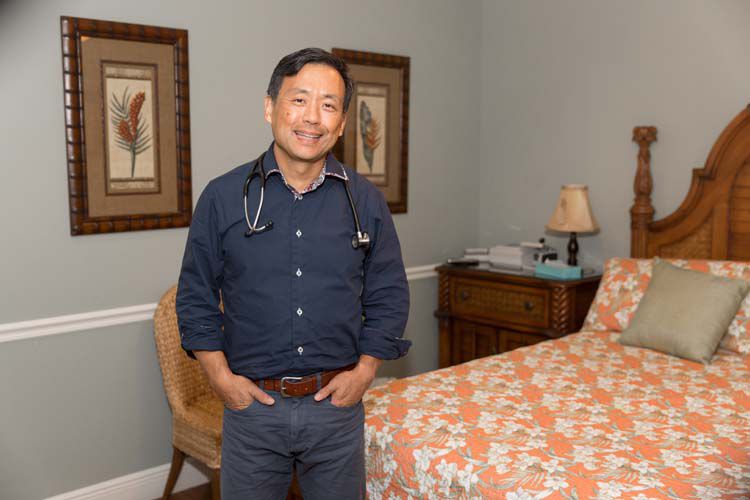
A new study concludes that certain types of sleep disorders increase the risk of stroke and, if untreated, can hamper stroke recovery. That backs up what Vero sleep specialist Dr. John Suen has learned from other studies, prompting him to put a list together of treatment options to get more and better sleep in the hopes of preventing stroke.
The research team, from University Hospital Essen in Germany, conducted a meta-analysis, which means they analyzed the results of previous studies – 29, to be precise. These 29 studies involved over 2,300 patients who had experienced some form of stroke. Results were published in the journal “Neurology.”
In their analysis, the researchers found that a sleep disorder was present among a significant percentage of stroke patients, with the percentage varying depending on the type of stroke the patient had experienced. It was found in 72 percent of those who had an ischemic stroke, which occurs when blood flow to the brain is blocked, and in 63 percent of those who had a hemorrhagic stroke, which happens when an artery in the brain ruptures or leaks.
Suen, who is medical director of Sleep Disorders Center Florida, says those results are consistent with what past studies have shown.
The type of sleep disorder the researchers were able to associate with strokes is called “sleep-disordered breathing” and are characterized by abnormal respiratory patterns, either in the form of apnea (the person stops breathing for 10 seconds or more, waking up just enough to take a breath) or hypopnea (the person’s breathing becomes shallow for 10 seconds or more).
“Having a sleep disorder is a risk factor for stroke for two main reasons: it decreases oxygen levels and our bodies then compensate by creating a surge in hormones,” says Suen. “These hormones can cause damage to blood vessels.”
There is good news: while the researchers found that sleep-disordered breathing persisted during stroke recovery, they also discovered that the symptoms improved with treatment. Suen says the gold standard is the use of a continuous positive airway pressure (CPAP) machine, which provides a constant flow of air through the nasal passages during sleep.
There are other treatments available for those who can’t tolerate the use of a CPAP machine; some are fairly new to the market. Suen’s list includes:
- Nose plugs that utilize nasal expiratory positive airway pressure (EPAP). “There’s some resistance when the person breathes in, which keeps the throat open,” Dr. Suen says. “It’s like a CPAP, without the electricity.” It is usually used in mild cases.
- For mild to moderate cases, there’s a custom-made dental appliance that pushes the jaw forward and opens up space at the back of the throat.
- For moderate to severe cases, there’s an implantable device that sends tiny electrical signals to the tongue; these signals stiffen the tongue, preventing it from going backwards in the mouth. Dr. Suen says, “It basically works like a pacemaker; it’s used for moderate to severe cases.”
Surgery is also possible, although it’s not a first-line treatment option. The procedure is called an uvulopalatopharyngoplasty (UPPP); it removes excess tissue in the throat to make the airway wider.
Sleep-disordered breathing was present less frequently – 38 percent of the time – for those patients who had a transient ischemic attack (commonly called a mini-stroke or TIA), in which blood flow to the brain is blocked for less than five minutes. While less serious than ischemic or hemorrhagic strokes, a TIA is a warning sign, and about a third of people who have a TIA will go on to have a major stroke within a year.
There is another category of sleep disorders called sleep-wake disorders that the team from Germany says may increase stroke risk and hinder recovery, but the evidence was weaker than for sleep-disordered breathing. Sleep-wake disorders reduce sleep duration. The most well-known is insomnia, but there are other types:
- Hypersomnolence, in which there is prolonged nighttime sleep or excessive daytime sleepiness.
- Circadian rhythm sleep disorders, in which people are unable to go to sleep or wake up at “normal” times.
- Restless leg syndrome, characterized by unpleasant sensations in the legs and an uncontrollable urge to move them.
- Nightmare disorder, which is exactly what it sounds like.
Sleep disorders are also common after a stroke, but researchers say very few stroke patients are tested for them. Study co-author Dr. Dirk M. Hermann says, “The results of our review show that should change, as people with sleep disorders may be more likely to have another stroke or other negative outcomes than people without sleep problems.”
John Suen is board-certified in sleep medicine, pulmonary disease, internal medicine, and critical care medicine. Sleep Disorders Center Florida is an accredited medical treatment center for all sleep-related issues. It is located at 3735 11th Circle #103 in Vero Beach; the phone number is 772-563-2910.



